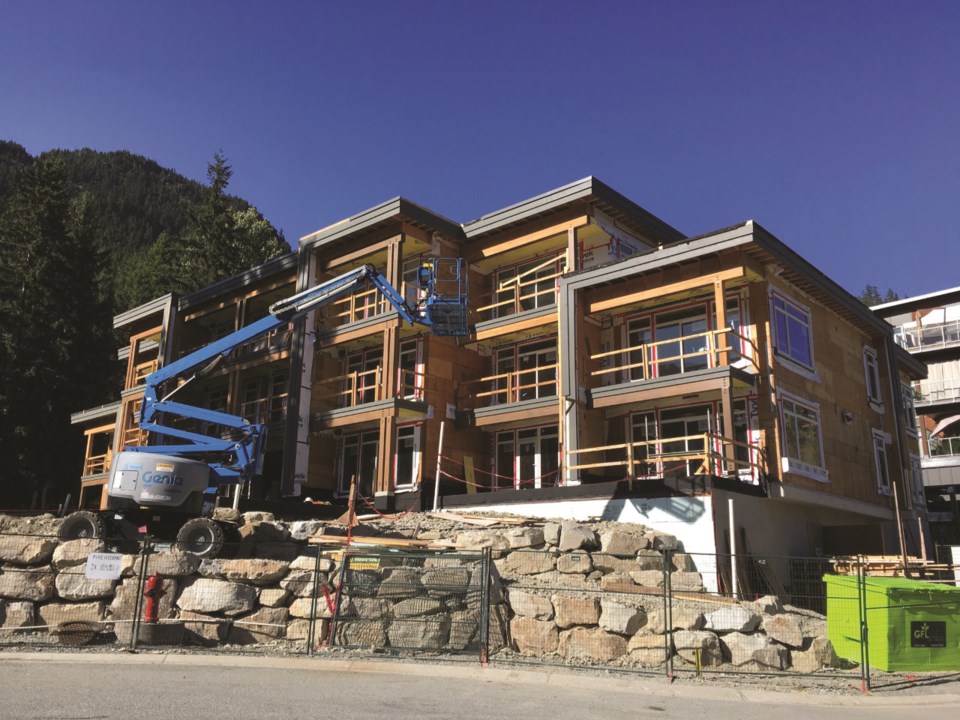With COVID-19 reinforcing concerns around long-term care facilities, members of Whistler’s growing senior population are thinking creatively to find ways to age in the community they call home.
One of those seniors is Sue Lawther, board chair of the Whistler Community Foundation, who has been exploring a concept with a handful of other seniors that would see them fund the hiring of two caretakers to tend to the group of 12 and live onsite in a spare bedroom at two of their townhomes in Cheakamus Crossing’s The Rise complex. Along with preparing meals for the group, the caretakers would also ferry the seniors around in a wheelchair-equipped, eight-passenger van they are contemplating buying.
“We just thought that would be a more viable option, to bring the caretaker into our environment and create our own little better-at-home homecare unit,” she said. “It’s only a concept, but I think it indicates that seniors are trying to think outside the box.”
Making up seven per cent of the resort’s permanent population, the proportion of seniors in Whistler still falls well below the national average of 18.3 per cent, unsurprising for a community that relies so heavily on a younger workforce. But the rate at which Whistler’s senior demographic is growing is astonishing nonetheless: between the 2011 and 2016 census, the resort’s senior population rose by a whopping 67.7 per cent.
And with long-term care facilities sitting at the centre of numerous COVID-19 outbreaks across the country, seniors may be looking to other housing options as they move into the later stages of life.
“Going into these long-term care homes, that’s now become something people really want to avoid,” said Councillor Cathy Jewett. “The other thing is we have a wonderful place to live here, so trying to stay in the community is really important. I know that’s my intention, but at what point will that be impossible?”
Whistler’s relatively low ratio of seniors has added to the challenge of accessing resources here. Many seniors are forced to travel outside of the resort for medical care, and even determining the need for a hospice—a four-bed facility opened in Squamish last year—was based off of the Sea to Sky’s entire population, rather than just Squamish. And while the Whistler Housing Authority has built designated seniors housing in Cheakamus and Rainbow in recent years, it’s not realistic to think the resort will be home to a long-term care facility anytime in the near future.
“I think it’s being realistic and working with the conditions we’ve got at this time,” Lawther said of her DIY housing concept. “Sure, I could sit there and say, ‘I wish the government was doing everything,’ but I don’t think we can look to the government to solve all our problems. I think it’s possible to do things on our own.”
Alternative housing models, like co-op living, are another option, Lawther believes, although similar projects floated in the past have failed to gain much traction.
“Pat Frewer, his company is called Seniorhome, we’ve met with him many times and he’s expressed a huge interest in developing some sort of facility that would respond over time to seniors,” she noted. “He’s built quite a few of them throughout the Lower Mainland and on the island. They’ve been very successful, but they take a huge population. He’d really have to sharpen his pencil and council would have to come to the table not necessarily with free land but really cheap land, and they don’t have that to give him.”
Kathy White, chair of the Mature Action Community (MAC), said the group is working with the municipality and other organizations to try and make Whistler a more welcoming place for seniors, based on the World Health Organization’s concept of an “age-friendly” community.
“Behind us, there are a bunch of people in their late forties and fifties going, ‘With COVID, how do I want my senior years to look? Do I want to stay here? Do I want to downsize out of my house and buy a one-bedroom condo and a townhouse, and have an investment property? How do I want to structure my life?’” she said.
“Those kind of conversations are the next priority: Communication and engagement not only with the resort, but with other community organizations to figure out how we can help each other.”
To share ideas with MAC on aging in place, email [email protected].




